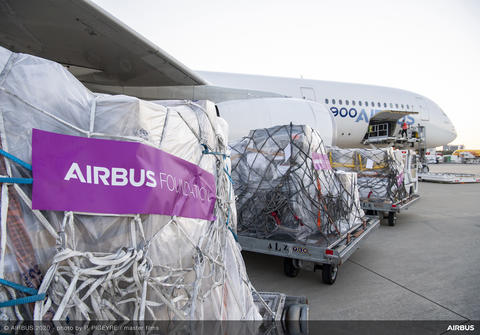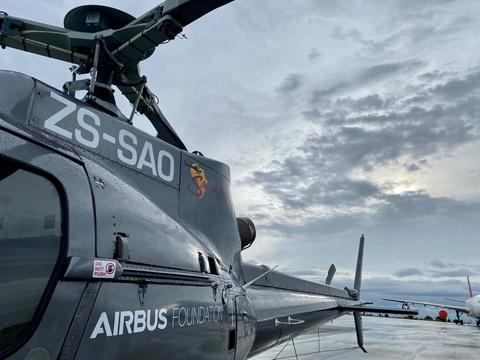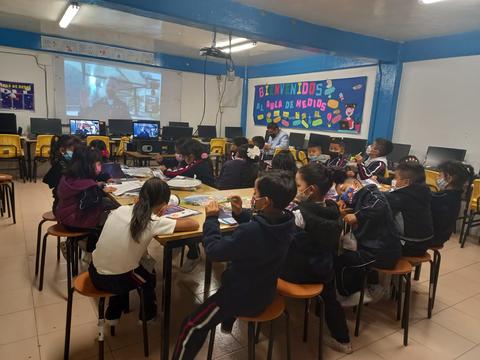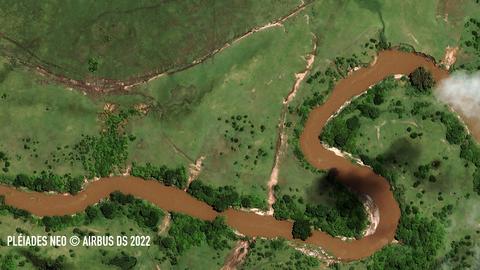At a
Glance
The Airbus Foundation stepped up its activities in 2022, benefitting from the easing of COVID-19 restrictions and building on accomplishments achieved during the previous two years despite the pandemic’s impact.
In 2022, the Foundation maintained the focus on its three core pillars: Humanitarian Aid, the Environment, and Youth Development.
Key figures
Global emergency response
175
tonnes of aid to support key actors in global emergency response.
Helicopter flight hours
210
chartered in response to flooding, famine crisis and population displacement due to natural disasters
Youth development programmes
9000
students directly reached throughout the programmes implemented across 17 countries supported by 260 Airbus volunteers
Satellite imagery
15,000
square kilometres covering 78 requests answered. This imagery and data aid support disaster assessment, response plans, human displacement monitoring, flooding surveillance, and medical support.
Humanitarian Aid
Support from air, space and at sea
Since the Airbus Foundation’s launch in May 2008, it has facilitated more than 95 relief or goodwill flights to numerous destinations around the globe – transporting over 1,347 tonnes of aid.
Preparing a humanitarian operation is complex, with multiple stakeholders involved. It typically takes a minimum of three days from receiving the initial NGO (non-governmental organisation) request to gather the relevant information for the initial go/no-go decision.
The timing depends on factors that include the partner’s preparedness, the request’s complexity, how many actors are involved, and whether all the necessary information is provided. Before engaging in any mission, due diligence is mandatory for any of the stakeholders involved.
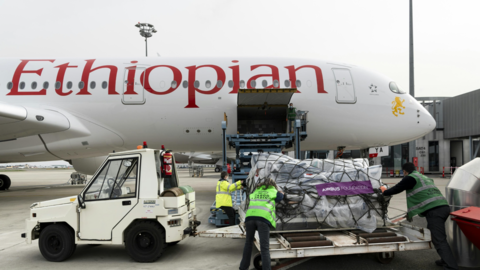
Bringing relief with airlift
In 2022, the Airbus Foundation organized humanitarian flights to six countries, including Ethiopia, Madagascar, Moldova, Poland, Pakistan, and Somalia. The flights aimed to provide aid and assistance in response to various crises such as hurricanes, flooding, famine, and the war in Ukraine.
Over 175 tonnes of aid were transported, thanks to partnerships with organizations like Aviation Without Borders, Action Against Hunger, the French Crisis and Support Centre, the World Health Organization, and the International Federation of Red Cross and Red Crescent Societies.
Specific efforts included airlifting 23 tonnes of relief items to Madagascar after cyclone Batsirai, delivering aid to Moldova for Ukrainian refugees, responding to a health emergency in Ukraine with the World Health Organization, providing aid for flood-affected areas in Pakistan, and addressing the drought and food crisis in Somaliland. Additionally, the Airbus Foundation collaborated with Ethiopian Airlines to transport medical items to Ethiopia, and signed a Memorandum of Understanding with the Spanish Agency for International Development and Cooperation to enhance humanitarian response capabilities.
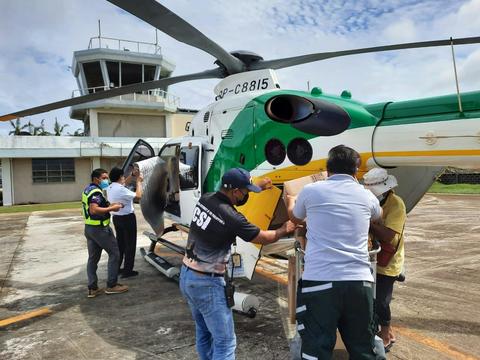
Vital support with helicopter missions
The Airbus Foundation has chartered over 210 helicopter flight hours and granted over 1,310 flight hours to emergency responders since 2013.
In 2022, it supported vital missions in Asia and Africa, partnering with organizations like the French Crisis and Support Centre, the International Federation of Red Cross and Red Crescent Societies, Action Against Hunger, and the Kenya Red Cross.
The helicopter services played a crucial role in providing aid and relief after hurricanes, famine, and displacement in the Philippines, Madagascar, the Democratic Republic of Congo, and Kenya. For example, in the Philippines, they transported essential products to areas affected by Typhoon Rai Odette and delivered urgent humanitarian aid, including medicine and water purifiers. In the Democratic Republic of the Congo, they assisted Action Against Hunger by donating flight hours and helicopter services to transport emergency teams and nutritional supplies to combat severe acute malnutrition. The Airbus Foundation's efforts has demonstrated the value of its agile capabilities in saving lives and supporting communities in need.
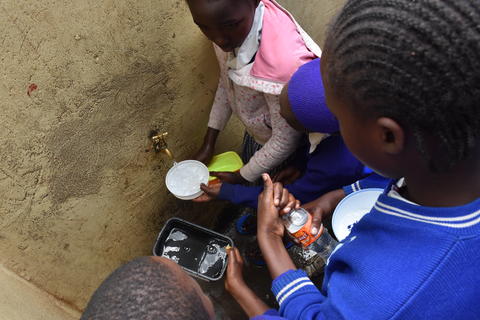
Reinforcing the foundation’s relationships
The Airbus Foundation strengthened its partnerships in 2022 through various initiatives.
In Kenya, they collaborated with the Kenya Red Cross Society to upgrade and install water units, improving access to safe drinking water and promoting hygiene practices. They also supported Action Against Hunger in a successful fundraising challenge, demonstrating their commitment to combating food insecurity and climate change. Additionally, the foundation partnered with the French Fondation de l'Académie de Médecine to provide training in helicopter emergency medical services, enhancing local emergency experts' skills. Through these efforts, the Airbus Foundation showcased its dedication to reinforcing partnerships and making a positive impact on communities worldwide.
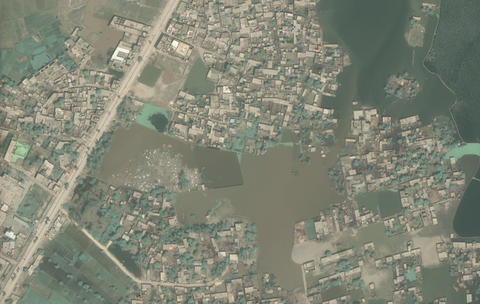
Satellite imagery in humanitarian aid
The supply of satellite imagery is a key element of the Airbus Foundation’s support of humanitarian relief, enabling humanitarian sector assessments of major natural disasters and crises worldwide.
With these satellite images and their analysis, emergency responders and disaster relief organisations are able to map out areas that otherwise could be difficult to access, thereby determining the severity of damage and coordinating the actions of their staff on the ground and in the air.
In 2022, the Airbus Foundation responded to an increased number of requests and delivered thousands of square kilometres of satellite imagery to its partners with the support of the Connected Intelligence team from Airbus Defence and Space.
Tailored training sessions also increased the partners’ in-house capacity to understand and analyse satellite imagery.
Youth Development
programmes circling the globe
The Foundation’s Youth Development pillar implemented programmes in 2022 that spanned 17 locations across Europe, Africa, Asia, and the Americas.
This involved approximately 260 Airbus volunteers and directly reached an estimated 9,000 students – with specific attention given to gender balance, while also including a pilot programme for children living in a refugee camp.
Another aspect of the Youth Development pillar was an enrichment of the Foundation’s STEM (Science, Technology, Engineering and Mathematics) content, with videos explaining certain aspects of the science behind aeronautics and space. The content, known as Airbus Foundation Discovery Space, is now available on a dedicated website and is offered in four languages (English, French, German, and Spanish).
Additionally, the fourth edition of the Moon Camp Challenge benefitted from the success of previous years, with 2,597 projects submitted in 2022 from 53 countries by over 5,600 students – supported by nearly 600 teachers.

The Airbus Foundation Discovery Space platform
The Airbus Foundation launched a new and improved Discovery Space platform to encourage interest in STEM subjects. It includes videos, tool kits, experiments and other resources that cover STEM disciplines. The content is tailor-made for users aged 8 to 18. Completely free to access, students can visit the website and learn at their own pace. The platform also is an excellent resource for use by teachers and parents in imparting an interest in STEM subjects to the next generation – either in a more formal classroom setting or informally at home.
The platform’s content – developed in collaboration with educational experts – is fully aligned with the Airbus Foundation’s support of the United Nations’ Sustainable Development Goal #4: Ensuring inclusive and equitable quality education, and promoting lifelong learning opportunities for all.
Everyone can benefit from these free resources, and thanks to the Airbus Foundation’s non-governmental organization (NGO) partners, the content is delivered directly to many underserved communities.
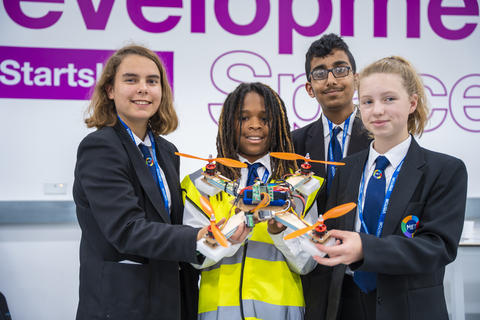
Deployment of programmes with NGOs
The Airbus Foundation continued its long-standing yearly partnerships with local non-governmental organisations, such as the Alliance pour l’Education, Télémaque, and FACE in France; with Ablaze and EDT in the UK; Fondo Unido in Mexico; the Kenyan and the Spanish Red Crosses, and others. The Spanish partnership was particularly notable because it engaged employees from all Airbus sites across Spain.
Each NGO partnership programme is built on local needs and has its own specificity. All of them aim to inspire children, while also developing the key soft skills that will help them in the future while discovering the professional world.
The Foundation’s partnerships for its youth programmes spanned 17 locations in Europe, Africa, Asia, and the Americas. During 2022, more than 250 Airbus volunteers participated. The programmes directly reached more than 9,000 disadvantaged young students, including a pilot project for children living in a refugee camp.
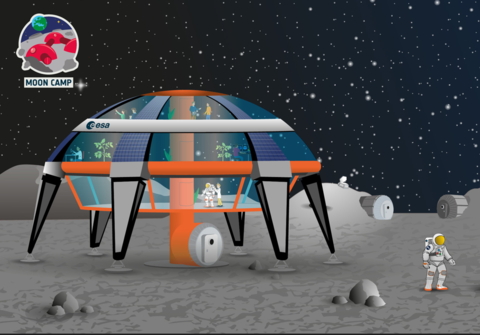
The Moon Camp challenge
The Moon Camp Challenge, a yearly competition by Airbus Foundation, ESA, and Autodesk, invites students worldwide to design lunar settlements using 3D modeling tools. In its fourth edition, over 2,500 projects were submitted from 53 countries, involving more than 5,600 students. Top performers had the opportunity to digitally meet ESA astronaut Franck De Winne.
The winning teams in the Pioneers and Explorers categories received a 3D printer. Closing ceremonies were held in various countries, organized by ESERO, inspiring young students in aerospace.
The fifth edition of the Moon Camp Challenge, launched in 2022, introduced new features. Projects can be submitted in any language, and a non-competitive category called Moon Camp@school was created for teachers and educators to showcase related projects.
Environment
Climate change, disaster prevention and biodiversity protection
In 2022, the Airbus Foundation continued to develop its Environment pillar, focusing on climate change mitigation and monitoring, along with climate change adaptation, disaster prevention and the protection of biodiversity.
This included a continued collaboration with the Connected Conservation Foundation to support the preservation of wildlife and natural ecosystems in South Africa and Kenya through the use of satellite imagery.
The Airbus Foundation also facilitated the provision of technical data and project management. As an example, development and analysis services helped validate the forest restoration barometer of the International Union for Conservation of Nature (IUCN) – providing images, data and the support of a technical team to carry out the analysis.
At the end of 2022, The Airbus Foundation signed an agreement with the Polar POD expedition to support both its scientific programme and the mission’s operational phase. The Airbus Foundation will provide access to products and services such as Earth observation satellite data, as well as offer additional capabilities for reliable high-speed telecommunications. This maritime expedition, led by the renowned French explorer and scientist Jean-Louis Etienne’s non-profit organisation, “Océan Polaire,” aims to better understand global environmental and climate dynamics.

Collaboration with the Connected Conservation Foundation
In 2022, the Airbus Foundation collaborated with the Connected Conservation Foundation (CCF) to preserve wildlife and ecosystems in South Africa and Kenya using satellite imagery. They developed a five-year roadmap to provide high-resolution satellite imagery to park managers, aiding in the detection of poaching incidents and supporting the establishment of protected areas. The CCF combined the satellite imagery with on-the-ground technologies and data scientists to explore how artificial intelligence and satellite imagery can modernize wildlife surveys in Africa.
Traditionally, wildlife surveys in savannah environments were conducted using small aircraft, which was time-consuming and costly. To overcome this, the CCF/Airbus Foundation and other partners experimented with three different approaches for animal detection and identification in satellite images. While there were promising results, challenges remained in achieving the same level of accuracy as traditional surveys. However, the CCF and the Airbus Foundation aimed to share their findings with the conservation sector to help improve research in the future.
One positive outcome was the creation of a heatmap indicating potential animal sightings, assisting in locating hard-to-find animal colonies. The success of this project has encouraged further exploration of using satellite imagery for different species and ecosystems beyond African savannas.
To support biodiversity conservation efforts, the Connected Conservation Foundation and the Airbus Foundation launched the "Satellites for Biodiversity Conservation" initiative, inviting individuals and not-for-profit organizations to submit projects that utilize high-resolution satellite data for monitoring and recovering threatened species. The initiative received 47 applications, and winners will receive access to advanced satellite imagery and funding.
In addition, the Airbus Foundation aimed to increase employee involvement in supporting environmental objectives and promoted the fundraising efforts of the Connected Conservation Foundation through their +impact platform.
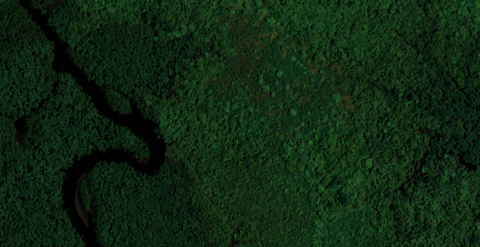
Partnership with the International Union for Conservation of Nature
The IUCN and the Airbus Foundation have formed a powerful partnership to monitor and support ecosystem restoration activities in over 40 countries. Their collaboration centres around the "Restoration Barometer," a global framework that digitises and centralises reporting and indicators into a geospatial portal. This enables a comprehensive assessment of the benefits of ecosystem restoration, including carbon sequestration, biodiversity impacts, and socio-economic advantages.
The Airbus Foundation plays a crucial role by providing satellite imagery training, technical support, and assistance in deploying advanced technologies. They work closely with the IUCN's field teams to ensure smooth implementation and enhance monitoring efforts. Additionally, the Airbus Foundation contributes technical data and project management services to validate the IUCN's forest restoration barometer. Leveraging the Starling digital platform, they provide imagery, data, and analysis support to gain valuable insights.
The Starling platform combines satellite images with machine-learning analytics to accurately map primary forests and monitor deforestation. It incorporates additional data like boundary lines, protected areas, and supply chain information for commodities such as palm oil and cocoa. This comprehensive approach aids in understanding forest cover dynamics and the impact of human activities on vital ecosystems.
Through this collaboration, the IUCN and the Airbus Foundation have integrated 500 images into a processing chain for indicator generation in the Restoration Barometer. The methodology is continuously refined with forestry experts to ensure accuracy. The partnership plans to validate the methodology in South American regions, further strengthening its scientific basis.
The IUCN-Airbus Foundation partnership represents a significant step towards global conservation. By leveraging technology and expertise, we empower restoration initiatives and promote sustainable practices.
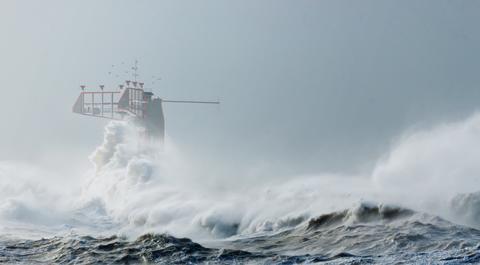
The Polar Pod Expedition
The Airbus Foundation has entered into a partnership with Océan Polaire to extend support to the Polar POD expedition in its scientific program and operational phase. This collaboration allows the Airbus Foundation to offer valuable resources, including access to Earth observation satellite data and reliable high-speed telecommunications services.
The mission undertaken by Polar POD aligns closely with the priorities of the Airbus Foundation and complements its existing projects that focus on land-based activities such as wildlife and ecosystem protection, as well as reforestation monitoring. By joining forces, the Foundation and Polar POD teams aim to successfully carry out this extraordinary mission and address the significant scientific and technological challenges together.
Led by Océan Polaire, the maritime expedition seeks to enhance our understanding of global environmental and climate dynamics. Over the course of multiple years, the expedition will achieve this goal by monitoring the Southern Ocean using an innovative low-carbon vessel known as the Polar POD. Unlike traditional vessels, the Polar POD is engineless and relies on the Antarctic Circumpolar Current, along with sails and wind power, for propulsion.
The primary objective of the Polar POD is to measure air-sea exchanges in order to advance climate studies. Furthermore, it aims to identify and analyze man-made impacts such as microplastics and pesticides, while also studying the ocean's weather, waves, winds, and color to enhance satellite calibration.
Through this partnership, the Airbus Foundation demonstrates its commitment to supporting initiatives that contribute to scientific knowledge, environmental preservation, and sustainable technological advancements. By leveraging its resources and expertise, the Foundation aims to facilitate the success of the Polar POD expedition and its valuable contributions to understanding and protecting our planet's delicate ecosystem.
